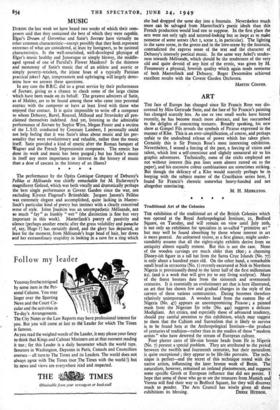MUSIC
DURING the last week we have heard two works of which their com- posers said that they contained the best of which they were capable. Elgar's Dream of Geronlius and Satie's Socrate have virtually no other common characteristic—except possibly that they both represent extremes of what are considered, at least by foreigners, to be national characteristics. Is the well-nourished, well-developed physique of Elgar's music healthy and Junoesque or simply blowsy, the middle- aged spread of one of Parsifal's Flower Maidens? Is the thinness and monotony of Satie's music that of an athlete and ascetic or simply poverty-stricken, the jejune hoax of a typically Parisian practical joker? Age, temperament and upbringing will largely deter- mine how we answer these questions.
In any case the B.B.C. did us a great service by their performance of Socrate, giving us a chance to check some of the large claims which have been made on its behalf. The greatest admirers of Satie, as of Mahler, are to be found among those who came into personal contact with the composer or have at least lived with those who enjoyed that contact. It is quite impossible to write off a composer to whom Debussy, Ravel, Roussel, Milhaud and Stravinsky all pro- claimed themselves indebted. And yet, listening to the admirable' performance of Socrate by Sophie Wyss, Megan Foster and a section of the L.S.O. conducted by Constant Lambert, I personally could not help feeling that it was Satie's ideas about music and his per- sonality that were revolutionary and valuable, rather than the music itself. Satie provided a kind of emetic after the Roman banquet of Wagner and the French Impressionist composers. The emetic has done its work and music has been purged ; but has Satie's music in itself any more importance or interest in the history of music than a dose of cascara in the history of an illness?
* * The performance by the Opera Comique Company of Debussy's Pelleas et Milisande was chiefly remarkable for M. Etcheverry's magnificent Golaud, which was both vocally and dramatically perhaps the best single performance at Covent Garden since the war, not excluding Kirsten Flagstad's Briirmhilde. Jacques Jansen's Pelleas was extremely elegant and accomplished, quite lacking in Maeter- linck's particular kind of poetry but instinct with a clearly conceived sense of style. Irene Joachim was an unsympathetic Melisande, not so much " fay " as frankly " wet " (the distinction is fine but very important in this work). Maeterlinck's poetry of passivity and silence (perhaps another emetic after the gross volubility and panache of, say, Hugo ?) has certainly dated, and the glory has departed, at least for the moment, from Melisande's huge head of hair, her doves and her extraordinary stupidity in looking in a cave for a ring which
she had dropped the same day into a fountain. Nevertheless much more can be salvaged from Maeterlinck's poetic ideals than this French production would lead one to suppose. In the first place the sets were not only ugly and tattered-looking but so inept as to make nonsense of some scenes (Act t, scene 2, in particular). The lighting in the same scene, in the grotto and in the love-scene by the fountain, contradicted the express sense of the text and the character of Debussy's intensely poetical music. In the same way Arkel's tender- ness towards Melisande, which should be the tenderness of the very old and quite devoid of any hint of the erotic, was given by M. Froumenty a physical, feverish quality which again made nonsense of both Maeterlinck and Debussy. Roger Desormiere achieved excellent results with the Covent Garden Orchestra.
MARTIN COOPER.


































 Previous page
Previous page